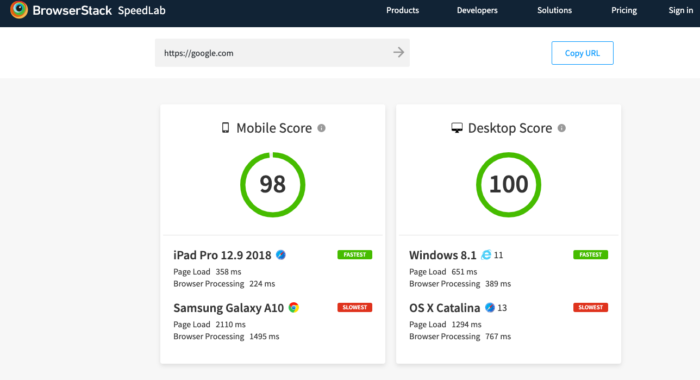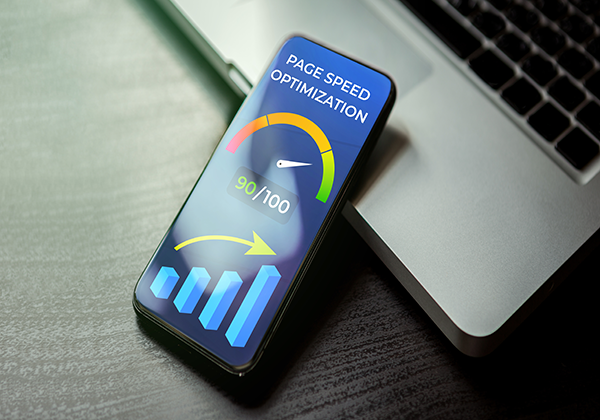Introduction
Mobile page speed is a critical factor in today’s digital landscape. With the majority of internet users accessing websites through their mobile devices, it is essential for businesses and website owners to prioritize optimizing their mobile pages for speed. In this blog post, we will explore the importance of mobile page speed and provide actionable tips on how to improve it.
1. Optimize Image Sizes

One of the key factors affecting mobile page speed is the size of the images used on your website. Large image files can significantly slow down the loading time. To improve mobile page speed, it is crucial to optimize image sizes. You can achieve this by compressing images without compromising their quality. There are various online tools available that can help you reduce the file size of your images.
2. Minify CSS and JavaScript
CSS and JavaScript files play a vital role in the functionality and design of your website. However, these files can also contribute to slower mobile page speed if they are not optimized. Minifying CSS and JavaScript involves removing unnecessary characters, spaces, and line breaks from the code. This process reduces the file size, resulting in faster loading times for mobile users.
3. Enable Browser Caching
Browser caching allows certain elements of your website to be stored on a user’s device, such as their smartphone or tablet. When a user visits your website again, the cached elements can be loaded from their device instead of being downloaded from the server. Enabling browser caching can significantly improve mobile page speed by reducing the amount of data that needs to be transferred.
4. Use a Content Delivery Network (CDN)
A Content Delivery Network (CDN) is a network of servers located in different geographical locations. By using a CDN, your website’s content can be delivered from the server closest to the user, reducing the distance data needs to travel. This can greatly improve mobile page speed, especially for users accessing your website from different parts of the world.
5. Reduce Redirects
Redirects are useful for directing users to the correct page when a URL has changed or been moved. However, excessive redirects can negatively impact mobile page speed. Each redirect adds an additional HTTP request, which can slow down the loading time. It is essential to minimize the number of redirects on your website to improve mobile page speed.
6. Optimize Server Response Time
The server response time is the time it takes for a server to respond to a user’s request.
Summary
Mobile page speed has a significant impact on user experience, search engine rankings, and overall website performance. Slow-loading mobile pages can lead to higher bounce rates, lower conversion rates, and frustrated users. Therefore, it is crucial to optimize mobile page speed to ensure a seamless browsing experience for your audience.
In this blog post, we will discuss various techniques and strategies to improve mobile page speed. These include optimizing images and videos, minifying CSS and JavaScript files, leveraging browser caching, and utilizing content delivery networks (CDNs). We will also explore the importance of responsive design and how it contributes to faster mobile page loading times.
By implementing the suggested tips and best practices, you can significantly enhance your mobile page speed, resulting in improved user engagement, hi see post gher search engine rankings, and ultimately, better business outcomes. So, let’s dive in and discover how to optimize your mobile pages for speed.
- Q: How can I improve mobile page speed?
- A: There are several ways to improve mobile page speed:
- Optimize images by compressing and resizing them.
- Minify HTML, CSS, and JavaScript files to reduce their file size.
- Enable browser caching to store certain elements of your website locally on a user’s device.
- Reduce server response time by choosing a reliable hosting provider.
- Use a content delivery network (CDN) to deliver your website’s content from servers located closer to your users.
- Q: Why is mobile page speed crucial?
- A: Mobile page speed is crucial for several reasons:
- Improved user experience: Faster loading times lead to better user satisfaction and engagement.
- Higher search engine rankings: Search engines like Google consider page speed as a ranking factor, especially for mobile searches.
- Reduced bounce rates: Users are more likely to stay on your website if it loads quickly, reducing the chances of them leaving immediately.
- Increased conversions: Faster page speed can positively impact conversion rates, as users are more likely to complete desired actions on a fast-loading website.

Hello, I’m Gabriel Huffer, a dedicated and experienced SEO Specialist with a passion for helping businesses thrive in the digital world. With a strong background in search engine optimization (SEO) and search engine marketing (SEM), I have honed my skills to deliver exceptional results for my clients.

